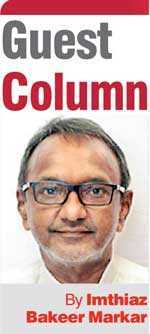Friday Feb 27, 2026
Friday Feb 27, 2026
Saturday, 27 March 2021 00:10 - - {{hitsCtrl.values.hits}}
|
D.S. Senanayake
|
It is 69 years since the Father of the Nation, Don Stephen Senanayake passed away, with his death anniversary falling on Monday 22 March.
He helmed the final phase of our struggle for freedom from colonial occupation, but I was not present then to experience his leadership first-hand. However, through reading his words and about his deeds I have come to know him.
A few days ago, I spent a considerable amount of time reading clips from newspapers and Hansard reports to get to know him.
I would like our readers to see a small part of a BBC Radio statement that Senanayake gave to the British people that was printed in the Sunday Times of Ceylon of 23 March 1952.
“We in the East through millennia of struggle towards the light, have learnt the bitter lessons of suspicion and fear, of fear and aggrandisement, of lust for power and exploitation of the weak, and we are convinced that it is only through clearer knowledge of fundamental spiritual values of existence that international understanding can be reached. We believe in a way of life I am permitted to call the middle-way, in which the rule of the moral law founded on the faith of the one-ness of humanity.”
The meaning of what Senanayake said, at the time and the place he said it and the way he presented, has lessons for today’s leaders as well.
He goes beyond East and West, beyond nationalities, religious and caste divides and talks of the one-ness of humanity. In making this statement it is clear that his thoughts were influenced by Buddhism.
Travelling further down that path, another statement he made, this time on the day the United National Party was inaugurated, comes
to mind.
“You maybe Sinhala, Tamil or Muslim, today we are all one nation. Let’s salute the Nation of Sri Lanka!”
The way Senanayake looked at nationalism is relevant to us today.
This was the day when those who were divided among the Sinhala Maha Sabha, the Tamil Congress, the Muslim League, the Burgher Association and the Moors Association came together under one flag.
Our colonial masters had told us that we would kill each other if we were given freedom, “so before we give you independence you must unite.”
Although they said that in public, they had plans to divide us along religious, ethnic, caste, up-country, low-country, Jaffna-Batticaloa lines.
Some who had become lured by these plans demanded the ‘50-50’ deal.
Senanayake and the others had the major challenge of unifying the nation.
India won her freedom through tragedy; their country was partitioned. But our leaders were able to unite the nation and could demand freedom saying, “we are united.”
In the first post-independence Cabinet Senanayake included the Tamil Congress Leader G.G. Ponnambalam. His determination to keep the country united was exemplified by this act and he was able to harness the abilities of these leaders for nation building.
Senanayake goes down in history not only as the leader who won us our freedom but also as the leader who built a nation by his actions that stands out as an example to all.
On his passing away the Daily Telegraph published an article in which the paper said he was kind, clever, determined and an excellent Parliamentarian. “He was able to build a strong coalition by attracting independent members to join his government and even succeeded in obtaining the cooperation of his fiercest opponents the Tamil Congress,” the Telegraph opined.
Senanayake was neither a white supremacist like President Trump of the United States nor a leader who followed the majoritarian philosophy of the emerging trends in India. He did not sow a majoritarian idea and make use of that to stay in power.
I see him as a leader who worked to uplift the oppressed masses and someone who worked hard and diligently towards that goal.
Politician Dr. M.C.M. Kaleel once said that he believes Sri Lankans will follow his example.
“Physically, mentally and morally Senanayake was a great man. His greatness was once again brought out in the dark days of 1915. After he was released from prison, he went all over the country in the company of Abdur Rahman, the Nominated Muslim Member of the Legislative Council, and brought about peace between the Muslim and Sinhalese communities. At large gatherings I remember Senanayake saying how he went about and lived in Muslim houses and had his meals with them
“The understanding and solidarity he brought about among the various communities in the island endured to this day and was by no means a negligible factor in the winning of Independence for this country.
“I well remember the tea party that was held at his residence ‘Woodlands’ just prior to the acceptance of the Soulbury Constitution, when our great leader and another gentleman from another place put to us bluntly the question ‘why not trust the majority community and we will never let you down.’ We immediately agreed and I can assure you, Mr. Speaker, we have had no occasion to regret that,” Kaleel said in Parliament.
That exchange between Dr. Kaleel and Senanayake is a beacon for the youth of today to follow. We can see the same forces trying to divide us as a nation. We must end the kind of politics that seeks to divide us and take advantage of us for their own ends.
We need to defeat those who want to divide and rule so that they can achieve their dangerous agendas. Whether these forces come from within the country or from overseas, defeating them and achieving unity and ethnic harmony will be the greatest honour we can give our founding Father D.S. Senanayake.